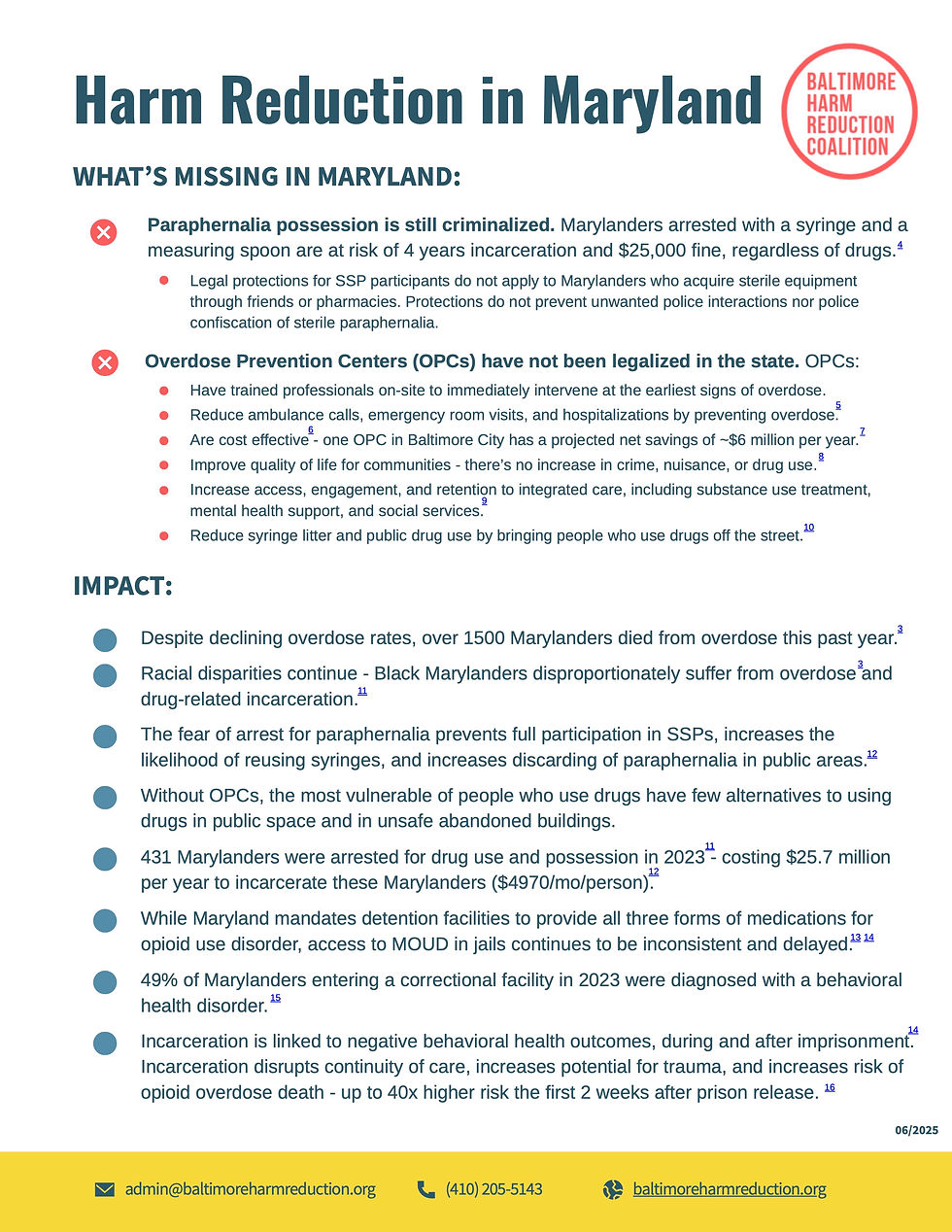A Letter In Support Of Harm Reduction | Suryah Studio
- Brian Suryah
- Aug 5
- 3 min read

On July 18th I sent this email to Baltimore City Mayor Brandon Scott and his Chief Of Staff Calvin Young with the help of a amazing template crafted by Baltimore Harm Reduction Coalition. I've decided to share this on my website because I think it's important. It's important because art and design do not exist in a vacuum. I've spent my entire life in Baltimore experiencing the violence of addiction, it's everywhere and touches the lives of everyone here. The reality of the world around me affects the what and the why of the work. At the very least, I think it should be, if you say your work is community-centered.
Within this, I lightly touch on an incident that happened at the opening reception of my solo exhibition God's Child, where a young man overdosed in the space within 5 minutes of the event ending. It was heartbreaking, and I felt so helpless. I wouldn't get a full night's sleep for a week after this. I could only think about how loved this person is and how to someone else, this young man is their entire world. Here they are alone and in crisis, fighting for their life and a cold concrete floor. I thank god for the worker-owners at Red Emmas. Before I could get to the Narcan in my purse, they had already mobilized and had EMTs on the way.
On the day I wrote this email, I ran into that young man in the same cafe. He was still on the streets. But he was alive and on his feet and fed with a hot meal from the pay-it-forward program I was using my exhibition to fundraise for. I still have so much I want to say but I'm not ready yet and that's okay. For now I want to use that space to highlight the work of Baltimore Harm Reduction Coalition.
"Baltimore Harm Reduction Coalition, Inc. (BHRC) is a community-based organization that implements public health services based in harm reduction, provides community trainings and other resources, and advocates for policies to expand harm reduction initiatives in Baltimore and across the state of Maryland. We believe in the value and dignity of all people, especially those who use drugs, engage in sex work, and/or have been impacted by the criminalization of such activities by the war on drugs and anti sex-worker policies. We believe we have a duty to assist in each other’s safety; thus, we have established and implemented programming to address this need at every level - individual, societal, and systematic."
Their History:
"Founded in 2011 as the Baltimore Student Harm Reduction Coalition, BSHRC was primarily comprised of graduate and undergraduate students in health fields. Our founders were not given harm reduction training in school and wanted to bring this perspective to current and future health professionals, forming a community of providers committed to practicing harm reduction in Baltimore. As the organization grew to include more practicing service providers and residents directly impacted by criminalization, we removed “student” from our name.
Today, BHRC represents and partners with a varied group of people, including those specifically targeted by anti-drug user and anti-sex worker policies, their loved ones, healthcare and service providers, advocates and organizers, public health workers, researchers, and other community members."
This letter calls for the mayor's support of Overdose Prevention Centers (OPC) in Baltimore City, an initiative the mayor has spoken in favor of in the past and one being advocated for locally by the BRIDGES Coalition for Overdose Prevention Sites.
"BRIDGES is an advocacy coalition working to end overdose and criminalization by promoting safe spaces, dignity, health, and justice for people who use drugs.
The overdose fatality rate in Maryland has consistently been above the national average since 1999, ranging from roughly 1.5 to 3 times the average rate. Overdose in Baltimore takes almost three times as many lives as homicide. Violence--often linked to the underground economy--and overdose are both issues that deserve immediate remedy. Each of these losses is preventable.
Overdose Prevention Sites (OPS) are safe, private facilities that provide people who use drugs a place for consumption and life-saving interventions, like naloxone and access to treatment services. OPS are a proven solution to the opioid overdose crisis. Data has shown that overdose fatality dropped 35% in the area around a single OPS within one year of opening, and in the 30+ years of operation across more than 100 countries, not a single death due to overdose has been recorded at an OPS."
Below are some incredibly informative one-pagers for those who are interested:






Comments